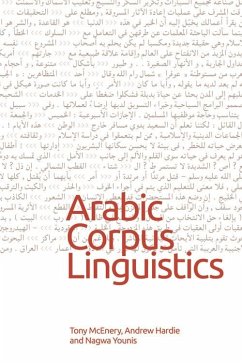
Word Formation as a Naming Device (eBook, ePUB)
Versandkostenfrei!
Sofort per Download lieferbar
69,95 €
inkl. MwSt.
Weitere Ausgaben:

PAYBACK Punkte
35 °P sammeln!
Ten Hacken and Panocová present a systematic overview of how different current morphological theories account for the naming function of word formation.Naming is an essential preliminary step for the effective use of language. In most linguistic theories, word formation is covered as a part of morphology. However, morphological theories, especially those in generative linguistics, tend to focus on the form and structure of words, rather than on their naming function. As a result, it is often not made explicit how naming is accounted for. In this book, the authors cover new ground in describin...
Ten Hacken and Panocová present a systematic overview of how different current morphological theories account for the naming function of word formation.
Naming is an essential preliminary step for the effective use of language. In most linguistic theories, word formation is covered as a part of morphology. However, morphological theories, especially those in generative linguistics, tend to focus on the form and structure of words, rather than on their naming function. As a result, it is often not made explicit how naming is accounted for. In this book, the authors cover new ground in describing and comparing theories from this perspective. They highlight the relevance of the naming perspective in both generative and functionalist approaches and in doing so challenge the way morphological theories are received and developed. The authors develop a framework for identifying which aspects of naming have been or can be covered in each theory and evaluate the success of the resulting account. The results of this comparison can be used for the selection of theories in research and teaching.
Naming is an essential preliminary step for the effective use of language. In most linguistic theories, word formation is covered as a part of morphology. However, morphological theories, especially those in generative linguistics, tend to focus on the form and structure of words, rather than on their naming function. As a result, it is often not made explicit how naming is accounted for. In this book, the authors cover new ground in describing and comparing theories from this perspective. They highlight the relevance of the naming perspective in both generative and functionalist approaches and in doing so challenge the way morphological theories are received and developed. The authors develop a framework for identifying which aspects of naming have been or can be covered in each theory and evaluate the success of the resulting account. The results of this comparison can be used for the selection of theories in research and teaching.
Dieser Download kann aus rechtlichen Gründen nur mit Rechnungsadresse in A, B, BG, CY, CZ, D, DK, EW, E, FIN, F, GR, HR, H, IRL, I, LT, L, LR, M, NL, PL, P, R, S, SLO, SK ausgeliefert werden.













